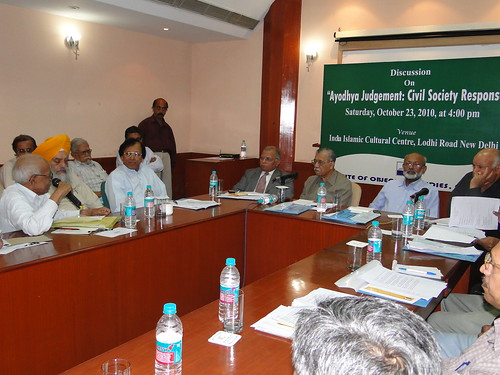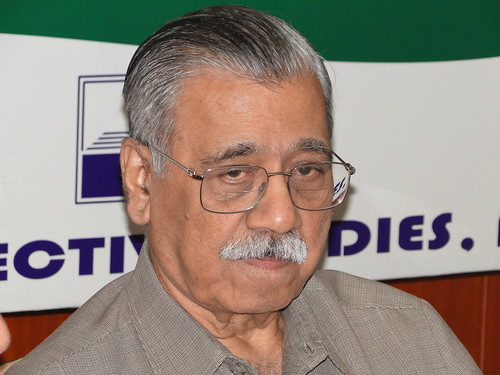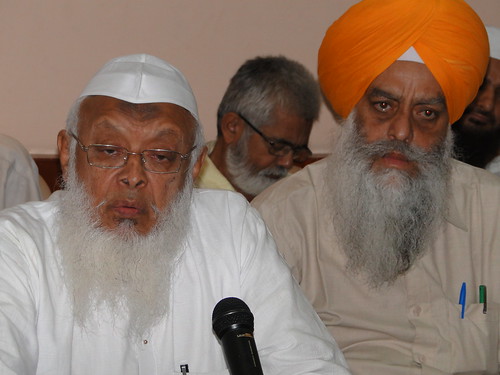By Md. Ali, TwoCircles.net,
New Delhi: Former Chief Justice of India A. M. Ahmadi said that the Supreme Court could have prevented the demolition of the Babri Masjid, had it acted on time.
The former CJI highlighted SC’s failure in saving the Masjid from the onslaughts of the Hindutva goons at a seminar on “Ayodhya Judgment: Civil Society Response” organized by the Institute of Objective Studies (IOS) here at India Islamic Cultural Center on Saturday.

Syed Shahabuddin (1st from left) making a point
Mr. Ahmadi substantiated his argument by saying that Milon Banerjee, the then Attorney General had specifically told the SC that he had confirmed reports that the Mosque was about to be demolished.
Failure of SC
Mr. Banerjee had also requested the two-judge bench of Justice M. N. Ventachaliah and Justice G. N. Ray to consider appointing the government of India as “the receiver of the land” where the kar seva was to be performed, Mr. Ahmadi further informed the participants of the conference.
“Had the Central government been appointed as the receiver of the land, the possibility of the demolition could have been averted,” added the former CJI.
Contrary to the need of the times, “the Court allowed a symbolic kar seva which led to the demolition of the mosque. Had the court order not been passed, the mosque would have been standing today,” Mr. Ahmadi further said.
He also criticized the Court for ordering “one day simple imprisonment” to Kalyan Singh, the then Chief Minister of Utter Pradesh.
Interestingly Mr. Ahmadi was part of the five-judge SC bench that heard the one line Presidential reference on Ayodhya.
“Ayodhya verdict is not a judgment”
Mr. Ahmadi said that he was “agitated” and was “taken aback” by the verdict. Calling the Ayodhya verdict as “a panchayati decision” Mr. Ahmadi pointed out that, “I doubt if this can even be called a judgment.”
Pointing out the implication of the verdict beyond the immediate context of the Babri title suit, the former CJI said that, “the rule of law and the secular ethos of the constitution are at stake on this verdict.”
Need to save the Constitution
Mr. Ahmadi appealing to the civil society saying that “civil society of this country owes it to the Constitution to get united to fight this verdict.”
Almost in a prophetic tone, Mr. Ahmadi said that the secular forces can’t afford to miss this opportunity to “save the Constitution because this is not about Hindu vs Muslim.”

A. M. Ahmadi, Former CJI in the conference
This is a fight between the idea of India as a secular state and the ideology which wants to destroy the secular and plural fabric of this country, he added.
The former CJI on reconciliation
Mr. Ahmadi pointed out that an out of court settlement can happen only when all the parties are on “equal footing” in the sense that “there is a mutual respect for each other’s dignity.”
Arguing that “settlement can’t be foisted,” he pointed out that in Ayodhya case “there are efforts to foist the settlement on a particular community for the benefit of the other side.”
All-India Muslim Majlis-e-Mushawarat president Syed Shahabuddin said that it’s very important to appeal in the apex court against this “disturbing and extra-judicial verdict” to “take the matter to its legal conclusion” because only then “the respective parties will know where do they stand; then they will be better placed to negotiate.”
National Integration Council member Navaid Hamid asked all the Muslims along with the secular organizations and individuals to pressurize the government of India to interfere into this matter to save the Constitution of India against the onslaughts of Hindutva forces.

United for a cause – Arshhad Madani and Gurdeep Singh in the conference
Muslim psyche badly affected
Member-Secretary of the Sachar Commission Abusaleh Shariff pointed out that the Ayodhya verdict has “affected the Muslim psyche in an immense way” and will also influence the way the minorities will perceive their rights in the democratic and secular India.
The conference, which witnessed coming together of representatives of other minority communities like Christians and Sikhs as well as those from civil society at large, supported “the proposal of challenging it in the apex court with full sincerity and commitment. However, it is not averse to continue with the efforts to find a resolution to the Ayodhya dispute.”
The speakers in the conference also pointed out that the appeal should be drafted by “the best legal minds of India” and they should also “consistently supervise the legal fight in the SC.”
IOS chairman Dr. Manzoor Alam promised the participants that he will make sure that the matter be taken with “full sincerity and commitment.”
The seminar was participated by former Advocate-General of Utter Pradesh, S. M. A. Kazmi, Father Thomas, Editor of Aaj Di Awaaz, Gurdeep Singh, SC Lawyer, M. M. Kashyap, working committee member of All India Muslim Personal Law Board, S. Q. R. Ilyas, Jamiat Ulema-e-Hind leader Arshad Madani, SC lawyer Firoz Khan Ghazi, former IAS officer, Manzoor Ahmad among others.

